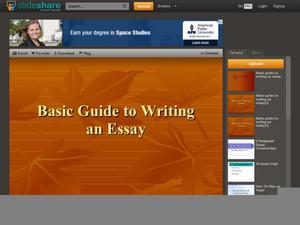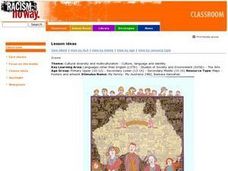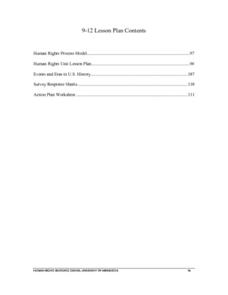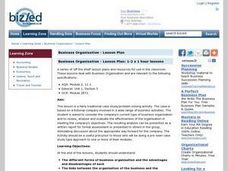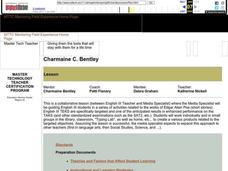iCivics
Drafting Board: Electoral College
Should the president of the United States be voted by the Electoral College or the popular vote? Your young historians will consider the pros and cons of the Electoral College, and make an argument using reasons and evidence provided in...
iCivics
Drafting Board: Community Service
Should schools impose community service graduation requirements? In the final lesson of the Drafting Board series, learners solidify their practice of crafting an argument supported by sound reason and evidence.
Curated OER
People Who Make A Difference: American Heroes
Students think about the characteristics of a hero so they can later evaluate which historical figures on the heroes chart meet the criteria.
Curated OER
Basic Guide to Writing an Essay
Introducing your class to essay writing? The gentle tone, concise explanations, and clear examples provided by a 17-slide presentation introduces young writers to the expository essay format. All that's missing is a complete essay with...
Curated OER
Legendary Myths Verses Modern Life
Students discover that some of the influences ancient myths have had on the way of life still practiced today in a Spanish speaking country they have chosen. They work in small groups to devise their own essential question, research...
Curated OER
Color
Students color in one of Keith Haring's design 3 different ways to compare how color effects a drawing. In this color lesson plan, students display their paintings and compare them as a class.
Curated OER
Taha Moana - The Sea
Students discuss language, meanings and ideas in a range of texts related to the sea. They write instructions, explanations, arguments and factual accounts, express personal viewpoints on topics related to the sea.
Curated OER
Racism No Way
Students explore different cultural influences and their contribution to Australian identities. They reflect on their own backgrounds and making links with their peers, reflect on our heritage. Students view My family- My Australia,...
EngageNY
Informal Proofs of Properties of Dilations
Challenge the class to prove that the dilation properties always hold. The instructional activity develops an informal proof of the properties of dilations through a discussion. Two of the proofs are verified with each class member...
Houghton Mifflin Harcourt
Heroes: Challenge Activities (Theme 5)
Dr. Martin Luther King, Gloria Estefan, Lou Gehrig. A biography, a civil rights quilt, inspiration poetry. This packet of support materials for the Houghton Mifflin Harcourt thematic units on heroes, contains enrichment activities...
Curated OER
Thanksgiving
First graders summarize similarities and differences of life in England and America for the Pilgrims by reading a mini-book. Then, they write a journal entry in first person on what it is like to be a pilgrim in England and in America....
University of North Carolina
Summary: Using it Wisely
Sometimes summarizing keeps a writer from going deeper into their analysis—don't fall into that trap. Learn the difference between summarizing and analyzing using an insightful resource. Focusing on introductions, the lesson shares...
Film Education
The Jungle Book
Accompany a viewing of Disney's live-action feature film, The Jungle Book, with a packet equipped with several activities focused on story elements. Scholars discuss and complete diagrams and charts about the movie's characters, setting,...
Curated OER
Social Studies: Human Rights Then and Now
Students examine past and present human rights issues in U.S. history. In reflection journals, they document both justices and injustices perpetrated on groups and individuals. Finally, students implement an action plan designed to...
Curated OER
Business Organisation - Lesson Plan: 1-2 x 1 hour lessons
Students are introduced to a business scenario. Students analyze strengths and weaknesses of a fictional organization.
Curated OER
Poe ... in the Real World?
Eleventh graders work in groups to choose a project/presentation from a list of approved activities to develop. They select and use appropriate software for organizing and refining their product. Groups produce a short...
Curated OER
Guess My Shape
Students describe shapes to other students who have to guess that shape. In this shape lesson plan, students describe shape attributes to other students. Then those other students have to guess the shape that is being described to them....
It's About Time
Organizing a Store
When provided with multiple objects, how many ways can the class organize and display them based on predetermined factors? Assist class members with a handy activity—theoretically teaching them concepts to understand periodic table...
Curated OER
Greek Architecture
Students explore the Parthenon. In this lesson on Greek Architecture, students view a video on classical architecture, then split into groups to research assigned architectural elements such as capitals, columns and floors. They then...
Curated OER
Land of Milk and Honey Relocated or Not (Lesson 3)
Fourth graders practice their research skills. In this North Carolina history instructional activity, 4th graders examine primary resources and draw conclusions regarding the birth of the city of New Bern, North Carolina.
Curated OER
Introduction to Biometrics
Students use the internet to research how biometrics is being used in the real world today. They work together to research hand geometry applications. They share their findings with the class.
Curated OER
Who IS That Woman?
Learners participate in a jigsaw reading activity about the contributions of Sacagawea to the Corps of Discovery. They also write a poem to reflect upon what they studied.
Curated OER
We are girls
Students examine the skills, attitudes and behaviors that help young
people to speak up for themselves. They watch a commercial which is aimed at young girls who fall in the 'tween' age group.
Curated OER
Everyday Heroes
Students view a video on September 11, they discuss their emotions and reactions after viewing the tape. They discuss and analyze the different definitions of a hero in the context of September 11 and their own lives. Students write...





